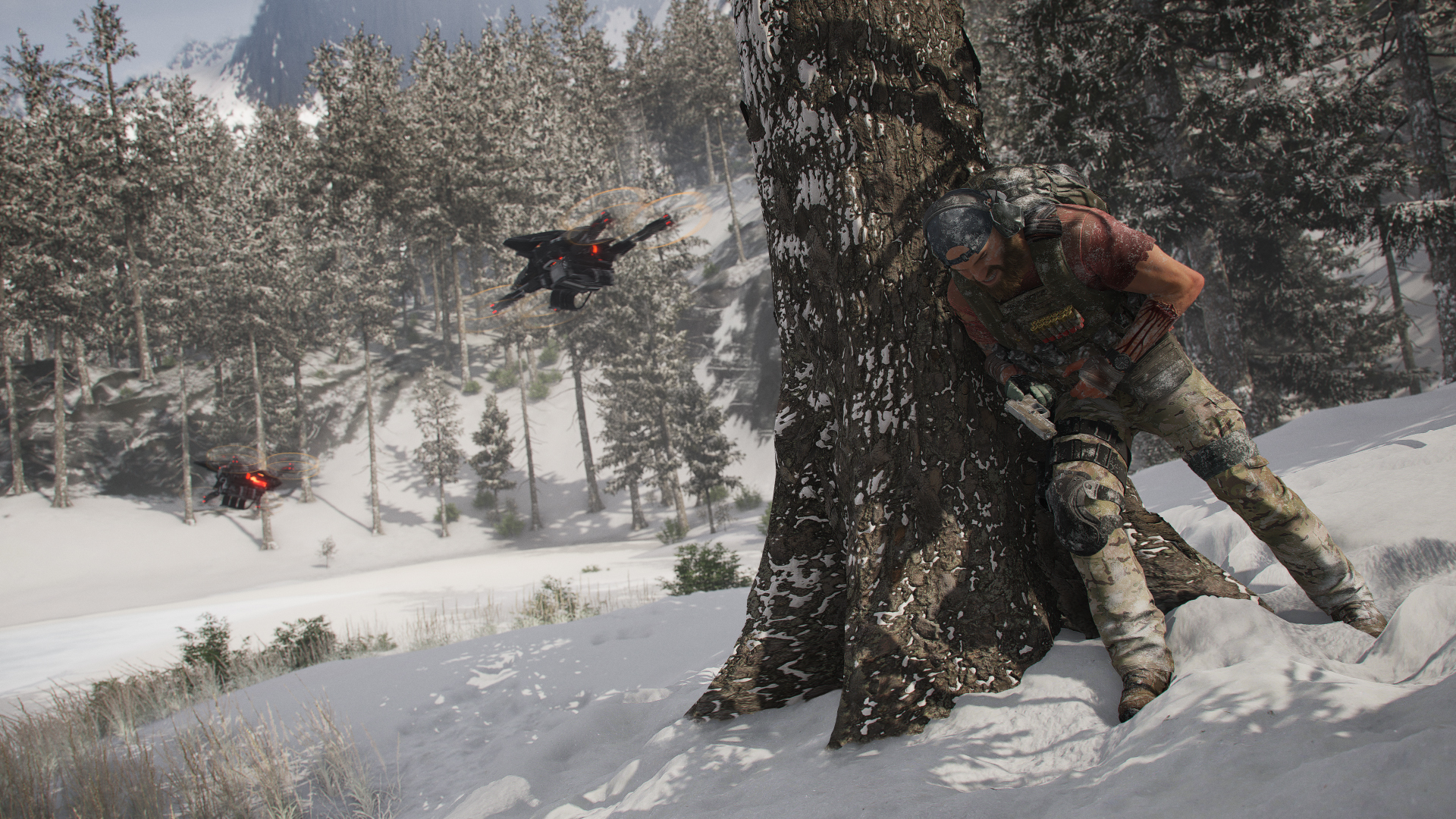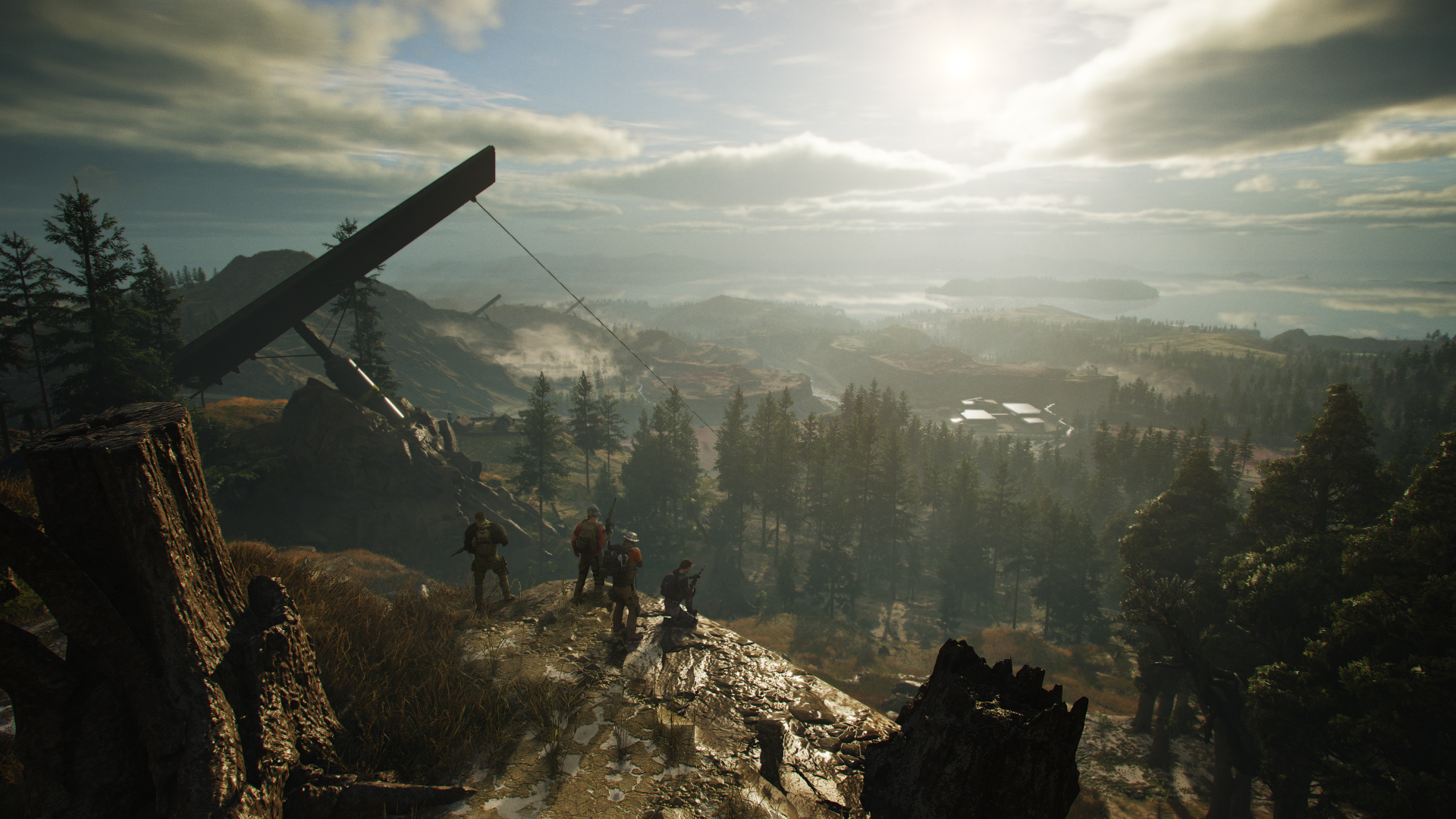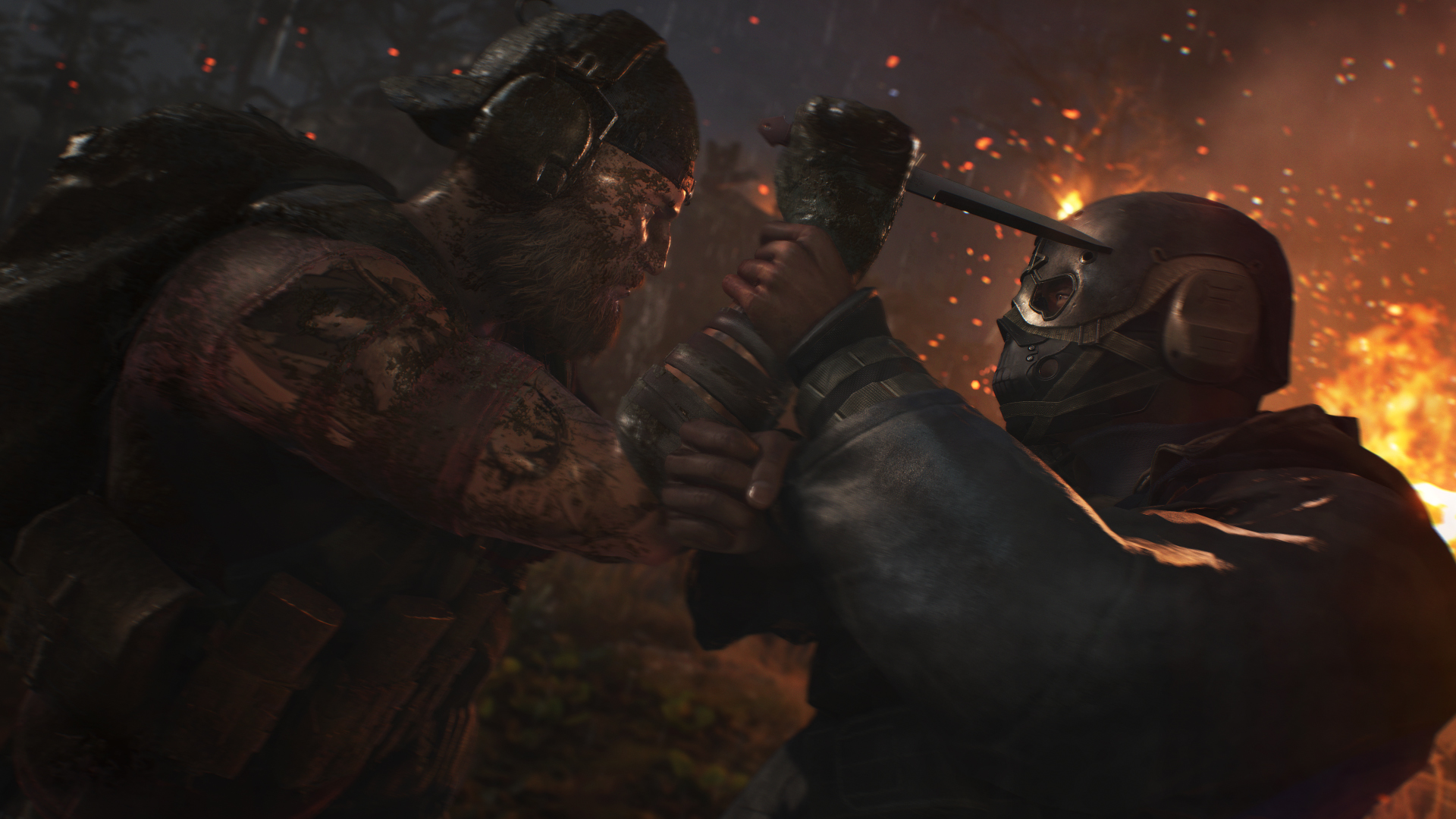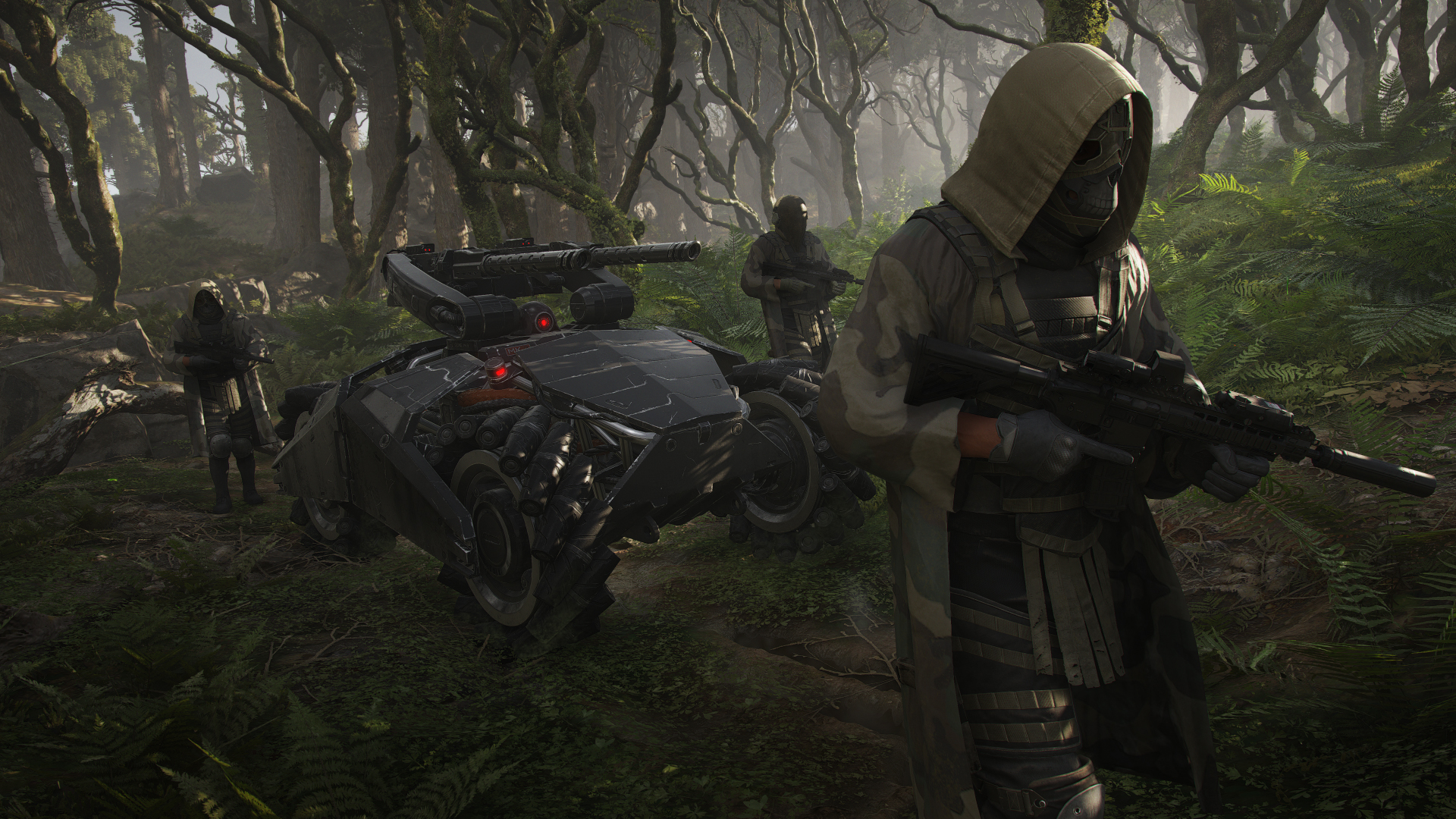Ghost Recon Breakpoint is more about survival than Wildlands, but it lacks a compelling hook
The hunter becomes the hunted.
Ghost Recon Breakpoint, developed by the team behind Wildlands, begins with that old military videogame favourite: the helicopter crash. High above the jungles of the fictional Auora archipelago—a remote chain of islands somewhere in the Pacific—a swarm of… something attacks your chopper. The black, swirling cloud looks like it could be bats, or maybe insects? But the electronic chittering sound it's making, and the fact it seems to actually be targeting you, suggests it might be something altogether more sinister.
The Auora archipelago is home to Skell Technology, a massive corporation that makes everything from home computers to automated war machines. It's the latter, a growing threat to the world, that brings the Ghosts here. Despite being a relatively small archipelago, Auora contains several diverse biomes including forests, deserts, an active volcano, and snowy mountains. It makes no geographical sense, and call me a cynic, but it feels like an environment that's been tailor-made for a battle royale mode. Such a mode hasn't been confirmed (or even hinted at) by Ubisoft yet, but c'mon, it's 2019.
The Ghosts' plan to infiltrate under cover of darkness and rescue a Skell engineer is scuppered by that bizarre swarm, which is the kind of thing you'd expect to see on the island from Lost. Breakpoint (out on October 4th) is set in the near future, and although not as fantastically futuristic as something like Future Soldier, this alternate timeline's technology is far in advance of our own. And, yes, there are drones: flying ones, ones that roll around on wheels, and ones you can use to scout a location and mark enemies. Ubisoft's love affair with drones is far from over, and they're actually central to the plot in Breakpoint.

As your chopper burns you limp away from the flaming wreckage and find yourself behind enemy lines, poorly equipped, injured, and hunted. An enemy militia calling themselves the Wolves are aware of your presence on Aurora, and they've painted a big red target on your back. These cloaked, mask-wearing soldiers are every bit as well-trained as you are, making them, in theory, a formidable foe. The idea of Breakpoint is to put you on the back foot; to make even a super-soldier like a Ghost feel like they're struggling to survive. As you explore the game's giant open world the Wolves are always hot on your heels, appearing when you least expect them.
The Wolves are always hot on your heels, appearing when you least expect them
The group is led by Cole D. Walker, a former Ghost turned villain who is played by Jon Bernthal, who you may recognise from The Punisher on Netflix. Walker was recently introduced in a free Wildlands mission called Operation Oracle, in which he was ostensibly a good guy. But now he's in full-on villain mode, leading the Wolves in their charge against you. Ubisoft says the story is much more important this time around. And while I don't think this series necessarily needs a strong narrative, it's encouraging to see the developer taking strides to make this aspect of the game more compelling than it was in Wildlands.
I must say, though: a flashback cutscene between Walker and returning Wildlands character Nomad (the bro with the beard and the baseball cap) has a very weird tone. The two characters have a relaxed conversation—the kind you'd have with an old friend in a quiet bar. But as they chat they're using a sniper rifle to casually shoot unidentified enemies in the head. One bullet doesn't quite land, and Nomad finishes the crawling enemy off with all the emotion of someone scrubbing a toilet. I don't know if this scene is supposed to make them look like badasses, or get across the idea that soldiers are people doing a job. But our alleged hero's cavalier attitude to death, which seems to be at least partly played for laughs, is just a bit odd, really.

But back to the game itself, because honestly, who's going to be paying attention to the story. This isn't The Wire; it's a military shooter. To reinforce the idea of being in a desperate survival situation—that you're not a bulletproof '80s action hero—Breakpoint introduces a few interesting new features, including the ability to sustain injuries. If you take a bullet in the leg you'll limp until you can set up a bivouac in the wilderness, craft a bandage, and heal it. Or if your arm is injured, the steadiness of your aim will be negatively impacted. In the middle of a firefight, injuries like this could massively change the dynamic of the mission.
Keep up to date with the most important stories and the best deals, as picked by the PC Gamer team.
The way the characters move has also been tweaked to add to the sense of struggle. Additional weight and momentum has been added to the movement controls, making climbing up steep slopes and across rough terrain a chore for the Ghosts. This will eat away at their stamina: a new thing you'll have to manage as you traverse the assorted rugged terrain of the world. Luckily there are plenty of land, sea, and air vehicles to commandeer if you don't feel like walking, including a much larger selection of high-tech military vehicles—something many Ghost Recon fans felt were sorely missing from Wildlands.
If your arm is injured, the steadiness of your aim will be negatively impacted
I get a feel for the game myself in an all-too-brief 15-minute co-op demo, which sees the Ghosts infiltrating a modern-looking office building to extract a scientist. We begin by tossing our drones into the air and scanning the exterior of the structure, tagging enemies, and deciding over our headsets what our plan of action will be. We decide to go in stealthy, and I use my sniper scope to pick off a few lone enemies who are out of sight of their allies. We move slowly toward the building together, avoiding civilians who, although harmless, will panic if they see you and can alert nearby enemies to your location.
We move methodically through the building, picking off guards, until we reach the upstairs office of our scientist friend. During a conversation with her, I notice that there are dialogue options to choose from: another example of the game's increased story focus. They aren't wildly different, however, which makes me wonder just how much scope for role-playing there will actually be. I press a button to rescue the scientist, which involves Nomad swiftly knocking her out with a punch and slinging her over his shoulder. Was that entirely necessary? It felt like an animation that would play when you take down an enemy, not a civilian you're allegedly supposed to be taking care of.

Incidentally, this is another new feature. Bodies can now be picked up and moved around. This will be useful for stealth, letting you shift fallen enemies out of the way of nosy guards. But it also works for your teammates in co-op, allowing you to ferry them to safety before healing them. Not exactly a revolutionary feature, but it should add an extra layer of interactivity and depth to the stealth aspect of the game—and make dealing with injured allies in co-op a lot easier. Breakpoint has been designed with both co-op and singleplayer in mind. Interestingly, if you play solo there are no AI squad-mates: you team up with a drone instead, including for the series' famous sync shots.
It feels like a game designed to tick as many boxes as possible.
Just as we're about to whisk the snoozing scientist away to safety, the shit hits the fan. Despite our stealthy infiltration, the dreaded Wolves show up, which appears to be a scripted moment. But, honestly, I was a little disappointed with them. They can kill you in a couple of hits, which forces you to stick religiously to cover. But other than that, they move and fight exactly like the other grunts we killed earlier. I mean, they look intimidating with their hoods and masks, but I didn't get the sense that I was battling some elite special forces group: just regular soldiers with better guns and cooler helmets. I think things will get more interesting when you fight the lieutenants, who have unique powers and personalities, which makes me wonder if they'll be similar to Metal Gear bosses.
Moment to moment, Breakpoint doesn't feel that different from Wildlands. The planning phase of the mission—scouting with drones, the infiltration of the office building—all felt very familiar. I did like the increased weight of the character movement, however. And the promise that mission objectives will have to be discovered by following intel, rather than marked on your map, sounds intriguing. Breakpoint has a few interesting new ideas, but it also feels like a game designed to tick as many boxes as possible: crafting, survival, open world, co-op, and so on. It's so all-encompassing, in fact, that I feel like it's hard to isolate the one thing Breakpoint is trying to do better than any other open world game.

If it’s set in space, Andy will probably write about it. He loves sci-fi, adventure games, taking screenshots, Twin Peaks, weird sims, Alien: Isolation, and anything with a good story.


